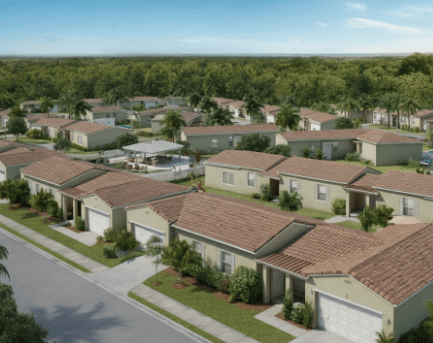In the swiftly changing landscape of today’s real estate market, the concept of Selling Land for Affordable Housing Projects has gained significant traction among landowners, developers, and policymakers. This blog aims to explore the multifaceted process of selling land for affordable housing projects, offering insights into how such transactions can not only maximize the impact on the community by providing much-needed housing solutions but also present profitable opportunities for landowners. We will traverse the legal, economic, and social considerations accompanying land sale for this noble cause, aiming to demystify the process and highlight the potential benefits and challenges stakeholders involved in these projects face. The potential for profitability is significant, and we aim to instill optimism about the financial benefits of these projects.
Renowned real estate investors Steve Daria and Joleigh have underscored the importance of utilizing land sales for affordable housing projects to benefit underserved communities and unlock substantial value for landowners. Their commitment to these ventures showcases how strategic investments can lead to impactful community developments and generate positive returns for investors.
The State of Affordable Housing in Florida
Florida, known for its sun-soaked beaches and balmy weather, has seen a drastic increase in the cost of housing, especially in urban hotspots.
This price surge has made homeownership an unattainable dream for most locals.
The need for affordable housing has never been greater as essential workers, young professionals, and growing families struggle to find a place to call home.

The Changing Demographics of Homeownership
Gone are the days when most Americans associated homeownership with stability and financial security.
Skyrocketing housing prices and stagnant wages have resulted in a shift in ownership demographics.
More and more individuals are turning to rental options, either by choice or necessity, and the demand for affordable rentals is exceptionally high.
Local Initiatives and State Programs
Thankfully, various initiatives and programs at the local and state levels are aimed at increasing the supply of affordable homes.
Tools such as tax incentives, grants, and streamlined zoning processes are being deployed to encourage the development of affordable housing projects.
Community land trusts, in particular, have gained traction for their ability to maintain affordability in perpetuity.
Get Started: Get Your Cash Offer Below…
We are direct land buyers. There are no commissions or fees and no obligation whatsoever. Start below by sharing where your property is and where we can send your offer…
Finding the Right Parcel: Sourcing Land for Affordable Housing
The first step in any affordable housing project is finding the right land. Sourcing suitable and economically viable land is a challenge that requires creative solutions and strategic partnerships.
Identifying Undeveloped or Underutilized Properties
Unused lands, such as brownfield sites or former industrial areas, can be prime candidates for redevelopment into affordable housing.
These projects revitalize the community and often offer tax incentives and grants that can significantly reduce development costs.
The Role of Public-Private Partnerships
Public-private partnerships (PPPs) are crucial in land acquisition for affordable housing.
By leveraging the resources of both sectors, PPPs can enable the purchase or donation of land at below-market rates, turning once inaccessible properties into the building blocks of new communities.
Navigating Zoning and Permitting Processes
Navigating Florida’s complex zoning regulations when selling land for affordable housing projects is a challenge worth addressing early in the process.
Developers and real estate investors selling land for affordable housing projects must align their proposals with these stringent zoning laws to ensure the success of their projects.
Understanding Florida’s Comprehensive Plan
The Comprehensive Plan, a crucial document, outlines objectives for housing needs and inventories, comprehensive land use plans, support facilities, and services.
Urban planners play a pivotal role in ensuring that developers’ affordable housing projects align with these policies, qualifying for favorable zoning considerations and potential financial incentives.
Advocating for Zoning Changes
Developers must often advocate for zoning changes for higher densities or mixed-use developments.
Effective engagement with local authorities and communities is essential to securing these changes and is integral to scaling up affordable housing projects.
Streamlining the Permitting Process
The permitting process can be lengthy and arduous. To expedite affordable housing projects, many jurisdictions have established expedited review processes or ombudsmen to guide developers through the maze of regulations.
Marketing an Affordable Housing Land Sale
A successful marketing strategy entails more than just selling a piece of land; it’s about shaping the future of affordable housing in our community.
The project’s success hinges on finding the right buyer, often a developer with a strong track record in affordable housing who shares our vision and commitment.
Targeting the Right Buyers
Identifying potential buyers with a genuine commitment to affordable housing and the capacity to develop begins with a profound understanding of the local real estate terrain.
This knowledge can help narrow the search to individuals or organizations likely to see the value in the land.
Showcasing the Investment’s Social and Economic Returns
Highlighting an affordable housing project’s social and economic benefits is a powerful sales tool.
Potential buyers, including investors and lenders, need to understand the positive impact the project will have on the community and their bottom line.
Funding and Investment Strategies for Affordable Housing
Securing adequate funding is one of the most troublesome tasks in affordable housing development.
A robust financial strategy is essential to bridge the affordability gap and make projects viable.
Leveraging Low-Income Housing Tax Credits
Low-Income Housing Tax Credits (LIHTC) are a primary funding source for affordable housing.
This program offers tax incentives to private investors in exchange for equity in affordable housing developments, helping to catalyze investment in these vital projects.
Blending Public and Private Financing
Many affordable housing developments utilize a blend of public and private financing, including grants, loans, and equity investments.
This hybrid process allows for more flexibility and can often bridge the financial divide that traditional funding cannot.
Construction and Project Management
Once funding is secured, affordable housing projects move into the construction phase. The most critical aspect of the project is managing construction costs while maintaining high-quality standards.
The Potential for Modular Construction
Modular or prefabricated construction offers significant time and cost savings, particularly advantageous for affordable housing developments.
By building in a controlled factory environment, developers can mitigate the risks associated with on-site construction and accelerate the project timeline.
Engaging Local Workforce and Contractors
Affordable housing projects also stimulate the local economy. Engaging local, minority-owned, and small businesses for construction work keeps dollars within the community and fosters a sense of ownership and pride in the project.
Marketing and Community Engagement
Successful affordable housing projects require buy-in from the local community. Marketing these homes effectively and engaging with potential residents is an art that requires sensitivity and awareness.
The Importance of Inclusive Outreach
Inclusive marketing and outreach strategies are vital to ensure that affordable housing projects reach those who need it most.
Collaborating with local nonprofits, community leaders, and advocacy groups can help developers connect with prospective residents.

Mitigating Stigma through Education
Affordable housing often carries a stigma, leading to opposition from existing residents.
Education campaigns that dispel myths and misconceptions about affordable housing can go a long way in building support and creating a more inclusive community.
Measuring the Impact of Affordable Housing Projects
The accurate measure of success for affordable housing projects goes beyond the number of units built.
Understanding the long-term impact on communities, residents, and the local economy is essential.
Quantifying Social and Economic Benefits
Affordable housing projects can lead to many social and economic benefits, from increased employment and enhanced property values to improved health outcomes and reduced homelessness.
Quantifying these benefits helps to advocate for future projects and secure additional funding.
Long-Term Sustainability and Affordability
Ensuring these homes’ long-term sustainability and affordability is a challenge that requires ongoing commitment and oversight.
Tools like ground leases, deed restrictions, and community land trusts can help maintain affordability for future generations.
Looking to the Future: Innovation and Best Practices
The future of affordable housing lies in continuous innovation and the adoption of best practices.
From new financing mechanisms to cutting-edge construction technologies, the field is ripe for exploration.
Exploring Innovative Finance Models
New finance models, such as social impact bonds and pay-for-success funding, are emerging as potential solutions to the affordable housing crisis.
These models align financial incentives with project outcomes, encouraging efficiency and accountability.
Harnessing Technology for Affordable Housing
Technology, including data analytics and intelligent building systems, promises to make affordable housing more efficient and responsive.
Innovations like 3D printing for construction and blockchain for property management are already beginning to reshape the sector.
Conclusion
Selling land for affordable housing projects is a monumental undertaking that requires dedication, collaboration, and a visionary approach. By understanding the intricate process of converting land into homes, stakeholders can work towards providing safe, decent, and affordable housing for all. The road ahead may be challenging, but the results—a more equitable and harmonious society—are well worth the effort.
**NOTICE: Please note that the content presented in this post is intended solely for informational and educational purposes. It should not be construed as legal or financial advice or relied upon as a replacement for consultation with a qualified attorney or CPA. For specific guidance on legal or financial matters, readers are encouraged to seek professional assistance from an attorney, CPA, or other appropriate professional regarding the subject matter.
